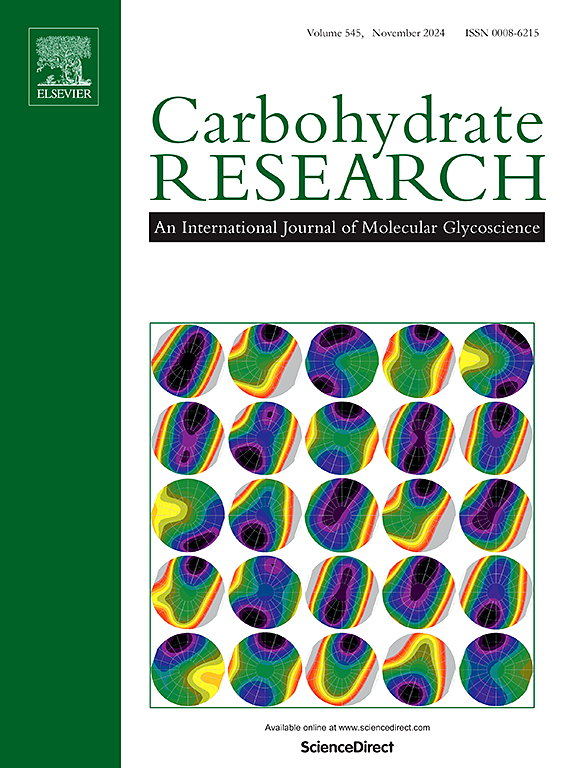微波辅助提取海蜇中糖胺聚糖样多糖
IF 2.4
3区 化学
Q3 BIOCHEMISTRY & MOLECULAR BIOLOGY
引用次数: 0
摘要
气候变化导致地中海水母大量繁殖,严重影响了旅游业和渔业等沿海经济。从水母中提取的多糖已成为一种有前景的生物材料。先前的研究表明,这些通过热水提取的糖胺聚糖样结构多糖具有促进伤口愈合的潜力。本研究旨在描述一种更环保、更快速的微波辅助提取jsp的工艺,同时保留其糖胺聚糖特征。评估了两种脱水方法——冷冻解冻和乙醇孵育——和两种MAE条件(140°C 10分钟或120°C 30分钟)。纯化样品得到两种多糖:一种是中性的,另一种是带负电荷的。对所选方法进行了物理、化学和生物性能评估,并在放大条件下进行了应用。结果表明,MAE适用于多糖的提取,对多糖的化学性质没有明显影响,但提取率提高了3.4倍。此外,RP-JSP在未来的生物医学应用中表现出最佳的生物相容性和抗氧化活性。本文章由计算机程序翻译,如有差异,请以英文原文为准。

Microwave-assisted extraction of glycosaminoglycan-like polysaccharides from Rhizostoma pulmo jellyfish
Climate change has led to increased jellyfish blooms in the Mediterranean Sea, significantly impacting coastal economies such as tourism and fishing. Polysaccharides from the jellyfish species Rhizostoma pulmo (JSP) have emerged as promising biomaterial for pharmaceutical applications. Previous research demonstrated the potential of these glycosaminoglycan-like structure polysaccharides, extracted via hot-water extraction, for wound healing. This study aims to describe a more eco-friendly and rapid microwave-assisted extraction (MAE) process for JSPs, while preserving their glycosaminoglycan features. Two dehydration methods - freeze-thawing and ethanol incubation - and two MAE conditions (140 °C for 10 min or 120 °C for 30 min) were evaluated. The samples were purified to obtain two polysaccharide fractions: one neutral and another negatively charged. Physical, chemical and biological properties were assessed, and the selected method was applied under scaled-up conditions. The results indicate that MAE is applicable for the extraction of JSPs, it does not significantly alter the chemical characteristics of polysaccharides while increasing the extraction yield of 3.4 times. Moreover, the RP-JSP displays optimal biocompatibility and antioxidant activity for future biomedical applications.
求助全文
通过发布文献求助,成功后即可免费获取论文全文。
去求助
来源期刊

Carbohydrate Research
化学-生化与分子生物学
CiteScore
5.00
自引率
3.20%
发文量
183
审稿时长
3.6 weeks
期刊介绍:
Carbohydrate Research publishes reports of original research in the following areas of carbohydrate science: action of enzymes, analytical chemistry, biochemistry (biosynthesis, degradation, structural and functional biochemistry, conformation, molecular recognition, enzyme mechanisms, carbohydrate-processing enzymes, including glycosidases and glycosyltransferases), chemical synthesis, isolation of natural products, physicochemical studies, reactions and their mechanisms, the study of structures and stereochemistry, and technological aspects.
Papers on polysaccharides should have a "molecular" component; that is a paper on new or modified polysaccharides should include structural information and characterization in addition to the usual studies of rheological properties and the like. A paper on a new, naturally occurring polysaccharide should include structural information, defining monosaccharide components and linkage sequence.
Papers devoted wholly or partly to X-ray crystallographic studies, or to computational aspects (molecular mechanics or molecular orbital calculations, simulations via molecular dynamics), will be considered if they meet certain criteria. For computational papers the requirements are that the methods used be specified in sufficient detail to permit replication of the results, and that the conclusions be shown to have relevance to experimental observations - the authors'' own data or data from the literature. Specific directions for the presentation of X-ray data are given below under Results and "discussion".
 求助内容:
求助内容: 应助结果提醒方式:
应助结果提醒方式:


